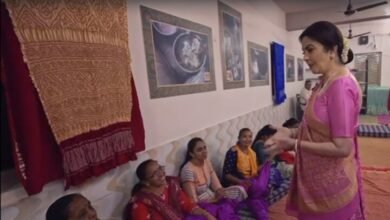
Bulbbul movie review: Pretty but problematic, Anushka Sharma’s Netflix film is a flawed fairytale

Bulbbul
Director – Anvita Dutt
Cast – Tripti Dimri, Rahul Bose, Avinash Tiwary, Parambrata Chattopadhyay, Paoli Dam
Over-directed but underwritten, Bulbbul is a visually striking film that is let down by a weak script.
From debutante director Anvita Dutt (whose track record as dialogue writer includes the runaway hit Queen but also Shaandaar, Kambakkht Ishq and Housefull), Netflix’s Bulbbul is the second streaming film this month, after Amazon’s Gulabo Sitabo, that is set inside a foreboding mansion. But while the dignified ‘haveli’ in Shoojit Sircar’s movie took on a life of its own, the one in Bulbbul, like the film itself, can’t help but feel artificial.
As an industry, Bollywood has been famously incapable of producing good horror cinema, with the odd exceptions, of course. Invariably, horror in India is combined with other genres such as musical or romance — ghosts, you see, mustn’t get in the way of the films’ box office potential. So for Bulbbul to whole-heartedly embrace its Gothic horror origins — it’s Kamal Amrohi’s Mahal by way of Guillermo del Toro’s Crimson Peak — is rather refreshing.
In 1881, Bulbbul, a precocious girl with an appetite for scary stories is married into a wealthy ‘zamindar’ family. In a deft move it is revealed that her husband isn’t the boy Satya, with whom she’s struck a quick friendship, but rather Satya’s sinister-looking elder brother Indranil, the Thakur, played by Rahul Bose. The Thakur has a twin, Mahendra, who is developmentally challenged and is married to a conniving woman named Binodini. Fate has forever sentenced her to play second fiddle to Bulbbul in the household, something that Binodini, the ‘chhoti bahu’, is very bothered by.
The characters established, the films jumps 20 years into the future. Satya, on his way back to the ‘haveli’ after having studied law in London, is informed that a series of mysterious deaths have taken place in the time that he has been away. The villagers seem to believe that it is the doing of a witch that haunts the surrounding forest. Satya, in proper Jonathan Harker mode, dismisses the claims as old wives’ tales.
But a lot has changed in the years that Satya has been gone. His brother Mahendra has been killed in his sleep, and his other brother, the Thakur, has disappeared. Bulbbul, meanwhile, is no longer the spirited young girl that she used to be; she has now fully embraced her life as the ‘Thakurain’ of the house, lounging on settees all day, being fed paan and sherbet, exuding a playful yet unsettlingly self-assured energy.
It doesn’t take a genius to put two and two together, but Bulbbul certainly treats its audience as if it is the first film they’ve seen in their lives.
Because the characters are so thinly written and the surprises so carelessly telegraphed, Dutt’s film is forced to rely more heavily on technical details. For instance, it would have been wonderful to explore the character of Binodini with more patience. She’s an interesting foil to Bulbbul; entrapped instead of empowered, scheming instead of self-reliant.
Swathed perpetually by the red glow of a blood moon, the nighttime sequences in Bulbbul are undeniably gorgeous, besides a couple of noticeable instances where cinematographer Siddharth Diwan’s camera basically breaks character, and surrenders its otherwise stately presence in favour of flashy handheld mayhem. It simply doesn’t gel. You’ll notice it, too.
Bulbbul also features a lush, orchestral score by the great Amit Trivedi, evoking memories of his terrific (but of iffy integrity) work in Vikramaditya Motwane’s Lootera. In a way, there is a strain of melancholy that runs through both movies, and Trivedi is able to capture it.
But employing a needlessly non-linear narrative turns out to be an exercise in futility, because virtually every twist can be seen coming from a mile away. And because so much of the film feels so deliberately planned, Dutt routinely finds herself drowning in style over substance, her script devoid of spontaneity.
A couple of scenes in particular, both involving violence against women, are questionably staged. Instead of evoking anger, or even repulsion, by shooting the first scene in stylised slow-motion that would made Zack Snyder twitch in ecstasy, Dutt essentially distracts the audience’s attention from the horror that is unfolding and turns it instead towards the immaculate beauty of her frames. The second scene, involving a rape, goes on for way longer than it has any reason to. What this does is play into the (problematic) trope that in order to blossom, a woman must first be (violently) broken. There’s a reason why the rape-revenge subgenre of horror is consider outdated.
I admire the fact that producers Anushka Sharma and her brother Karnesh are continuing to champion genre cinema, despite falling short of expectations more often than not. The disappointment is only amplified because the sibling duo’s brilliant Paatal Lok is still so fresh in our minds. But even though Bulbbul never quite takes flight, neither does it fall to its death. It’s no Mrs Serial Killer. But it isn’t Sacred Games either.







